A Quote by John Delaney
Many of the patients in military and veterans hospitals require long stays, which can place a large financial hardship on families who don't live near the hospital, which is very common.
Related Quotes
No veteran or active duty service member should endure a long hospital stay alone. Yet sadly, due to the high cost of travel, all too often our military families are separated while America's heroes receive care. Sometimes families sleep in hospital parking lots, unable to afford long stays in a hotel.
These are things that we hear from military families everywhere we go. But it - on PTSD, the thing that I want to make sure people understand is that the vast majority of veterans and military families aren't dealing with any kind of mental health. But there are - these are what are called the invisible wounds of this war. And many times they don't present.
Yes and no. Because America has only about 1 percent of the population serving in the military, it is hard for many civilians to understand the sacrifices military families make. However, my experience is that after the Vietnam War, the public learned that they should support the military whether or not they support the war. You've seen that outpouring of support for the veterans of both Iraq and Afghanistan.

































